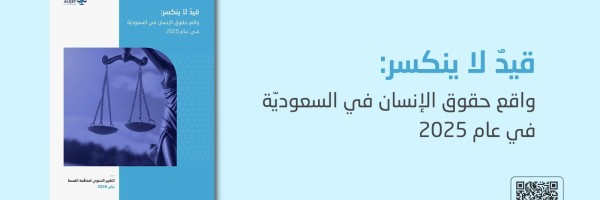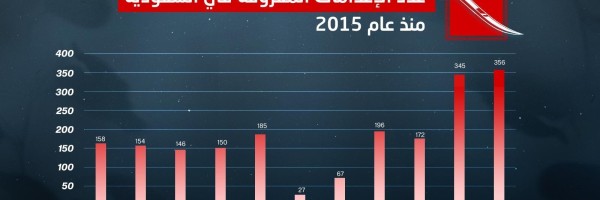A Saudi journalist, Turki al-Jasser, has unexpectedly been executed after seven years of enforced disappearance, on vague charges of terrorism, treason and endangering national security. His execution on 14 June dramatically illustrates the lengths the Saudi authorities will go to to suppress peaceful dissent.
A journalist with Al-Taqrir newspaper, al-Jasser tackled sensitive topics including women’s rights, corruption, and the plight of the Palestinians. He was arrested in March 2018 following a raid on his home and nothing more was heard of him until February 2020, when, in response to the UN Working Group on Enforced Disappearances, the authorities stated that he was being held in Al-Ha’ir Prison in Riyadh and investigated for alleged national security crimes. He was also allowed to contact his family for the first and only time since his arrest, but after February 2020 he was again forcibly disappeared, with the authorities denying him contact with the outside world and refusing to disclose his status or whereabouts.
On 14 June 2025, however, Saudi Arabia’s Interior Ministry announced al-Jasser’s execution on a number of extremely broad and vague charges of “terrorist crimes” including “high treason by means of communication with and conspiring against the security of the kingdom with persons outside it”; “receiving funds from them [these persons] to finance terrorist activities”; and “undermining the security of society and the stability of the state”.
Despite the lack of any further details regarding al-Jasser’s execution – typical of the absence of transparency in Saudi Arabia – his case nevertheless bears all the hallmarks of a pattern whereby the authorities conflate peaceful dissent with terrorism. Vague charges such as “undermining public order” and "destabilising security” are routinely used under the country’s draconian Counter-Terrorism Law to imprison and sometimes even execute peaceful activists, journalists and critics.
The internationally outlawed practice of enforced disappearance also remains widespread in Saudi Arabia and is extensively applied to prisoners of conscience. While disappeared, individuals are outside the protection of the law and thus at heightened risk of other human rights violations such as torture.
The lack of transparency around al-Jasser’s case reinforces concerns long raised by NGOs that the true number of individuals at risk of execution – and indeed the true scale of rights abuses in Saudi Arabia overall – is in fact greater than is publicly known or monitored. This raises urgent concerns for other disappeared individuals including humanitarian worker Abdulrahman al-Sadhan and preacher Sulaiman al-Dowaish.
Al-Jasser’s execution comes amid a recent surge in executions in Saudi Arabia. At least 149 individuals have been executed so far in 2025 – an 80% increase over the same period in 2024, the year that saw the highest number of executions in Saudi history: 345. The majority of executions this year (93) have been for non-lethal drug-related offences, and 14 for terrorism-related offences, which according to the vague and overly broad definition in Saudi law can include a wide range of non-lethal acts. Both these types of execution are in clear violation of international human rights law, which prohibits use of the death penalty for offences that do not meet the threshold of the “most serious crimes”.
Meanwhile the shocking execution of al-Jasser shows that a recent spate of prisoner releases cannot be seen as marking a turning-point in the Saudi authorities’ dire rights record and treatment of prisoners of conscience.
In light of the alarming scale on which executions are being carried out in Saudi Arabia, we once again urge the authorities there to immediately establish an official moratorium on executions with a view to abolishing the death penalty for all crimes. Pending full abolition of the death penalty, Saudi Arabia must immediately remove from its laws any death penalty provisions that are in breach of international human rights law, such as for crimes that do not meet the threshold of “most serious crimes”.
In addition, ALQST urges Saudi Arabia’s authorities to put an end to the practice of enforced disappearance, and to immediately and unconditionally release those arrested for peacefully exercising their fundamental freedoms.




